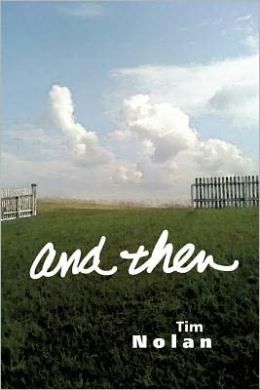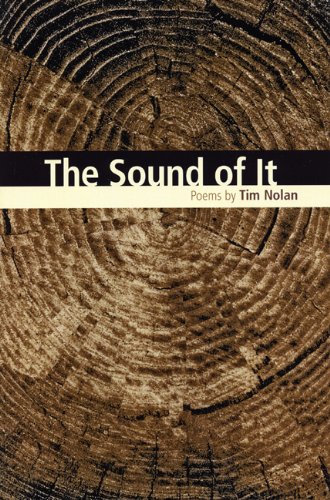Let me take the more recent of these books by Tim Nolan first. While he initially trained as a poet, taking his MFA degree at Columbia University, he had also married and knew he’d need a good job. His father was a lawyer back in Minneapolis and that seemed a good profession, so the newly “minted” poet returned and entered law school across the river in St. Paul. Along the way, he and his wife Kate became the parents of three kids – and so his law practice has provided a comfortable life over the years. Nolan’s poems were not gathered in book form until he was fifty-three – and then again more recently when he was a few weeks shy of fifty-eight. His observations are consistently fraught with the knowledge that we are capable of goodness as well as mistakes, that truisms reminding us we are only visitors on earth are still vividly, punchingly, true – and not without pain, longing, and inevitable sadness.
Nolan takes mixed joy in these pictures from memory. Here is the poet remembering his father in old age:
DAD
I have become him
for mine
And he is gone
I continue
At least for awhile
until someone else
Will be him.
It’s not just a way station –
This turning over –
he was a definite – he –
Himself – himself alone –
just like me
I wouldn’t burden
anyone with being – him –
It’s just that someone
must –
One critic, Brett Ortler, observed that Nolan uses lots of dashes as if to re-energize the poem, leaving the reader to accumulate meaning more easily. Other poems are denser from line to line but usually quite clear in intent, bringing celebration of ordinary things to an almost magical tone. For example, while his daughter plays the piano, he offers her a piece of freshly baked bread. She says Yes and continues her music: “. . . . . … .There is / no ulterior motive to bread, other than / growth – from the yeast, to the smile // of your daughter, to the breaking off / of the heel, which you love best, / the rounded end, the way it comes around.” (“Bread”)
Throughout his poems, Nolan tackles small pleasures as well as not-so-pleasant realities – such as winter (“Cold Night”), the mild contrariness of an elderly bachelor uncle (“Cleaning My Uncle’s Gutters”), and memories long ago of a childhood illness leaving his mother to worry (“Fever”). With both commiseration and straight talk without unnecessary harshness, these poems are at once comforting and a reminder that nothing was ever promised. And Then is a disciplined performance, one I enjoyed from page to page, lingering here and there – and then rereading the book just to make sure of my first impressions. To say the least, I wasn’t disappointed – and wondered why I hadn’t seen his poems much earlier.
Nolan’s first book, The Sound of It, is a precursor, of course, to And Then. A few prose poems are included, as well as recurrent themes of family life, memories before marriage, his children growing into young adulthood, as well as the odd celebrity appearing without warning – here is the entirety of “Once in New York”:
I spoke to Greta Garbo – I said –
“Good evening” – she said – “Good evening.”
I was a young man – she was an old lady –
but she was beautiful in her actions –
rushing across the lobby – she was as fleet
as a doe – turning in the dark forest –
wary of everyone in the woods – but not me –
she was not wary of me – I was harmless –
Then I knew the quick connection to something
rare and passing – the only living example –
Helen – long after the Greek men found their way
home – and tried to remember her voice again.
This reveals something about both people. Again, Nolan’s dashes move the reader’s eyes along quickly and back again.
“Diamond Lake Bowling” recalls his parents bowling with friends, the atmosphere both nostalgic and detailed, as if through these crisply depicted three-liners, his parents might return as they were years ago – but no, the business of a poet is to be evocative yet clear-eyed. Another instance of this is when his growing children are watching Citizen Kane, Orson Welles’ cinematic masterpiece filmed in his mid-twenties, never quite surpassed the rest of his career. (Welles died a quarter century ago suddenly at 70.) “The Kids Watching Citizen Kane” is one of many “best” poems in the book. More of this vibrancy is shown in “Cuttings” as the poet recalls a job he had in high school working at a hardware store. Again, dashes help convey energy. (One cannot help but wonder if Nolan uses as many dashes when writing a legal brief or a motion before the court.)
What sum? Tim Nolan’s poems are refreshing, energetic, and carry nostalgia frequently but as a light burden. Both collections display a superb command of craft and sensible portrayals of mortal limits. Indeed, after The Sound of It appeared in 2008, the few critics on duty were similar in response. “What seems on the surface a random collection of poems, daydreams, and reflections,” observed Keith Wain in The Corresponder (Fall 2008), “is really a collection of poems that portray the subtle mental maneuvers we all perform to keep from losing ourselves in the whirlwind of life.” I’d only add that not having a first book published until well after one’s fiftieth birthday (something I know about first-hand) isn’t such a bad thing. In both The Sound of It and And Then, the distilled essence of Tim Nolan’s poetry is a richly gathered beauty with mere words, the essential tools of the writer’s craft.
Both books are published by New Rivers Press, and are available here and here


